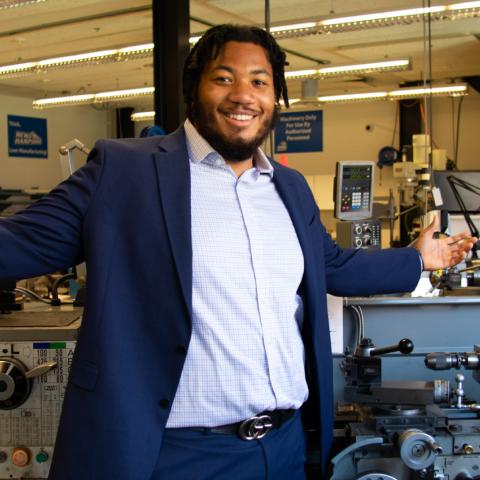
When college football recruiters came calling for high school sophomore Curtis Linton ’21, most of them shot down his idea of majoring in engineering, discouraging the idea that a star athlete would pursue such a challenging academic program.
But Curtis and his family had a plan — and it wasn’t just about playing football.
“Of all the offers I got, Coach Mac was the only one who gave me a shot,” Linton recalls, explaining the conversation he had with UNH Head Football Coach Sean MacDonald. “He said, ‘We’re going to offer you a scholarship, … from there, it’s up to you.’ ”
That was the first of many opportunities Curtis earned through hard work and determination. Now a senior, Linton looks back on both a successful football career at UNH and a stellar academic career as a McNair scholar and mechanical engineering major, who is sticking to his plan to get a doctoral degree to inspire the next generation of students.
“I don’t want the next Curtis Linton to go through their whole academic career without seeing another Black male professor or teacher,” he says about what’s motivating him to pursue a doctoral degree. “Even when I show my little cousins how things work from my classes or my research, just to see their eyes open in amazement, it’s like a whole different world. That’s a blessing.”
Education and hard work were ingrained in Linton as a child, when he would end up going to his mother’s night classes as she earned her undergraduate degree from Delaware State University, and to his father’s construction worksites, watching him work to become president of the company.
It’s a work ethic that served him well when things weren’t going well. The second semester into his freshman year, it got rough. “Football was hard, it was cold outside, I was depressed,” says Linton. “I had a C, two Ds and an F.”
But with his own determination (and maybe a little fear of getting in trouble with his parents), he turned things around. “I just put my head down and grinded.” He finished that semester with As, Bs and Cs.
The improvement also introduced him to the McNair Scholars program, which prepares talented, highly motivated undergraduates for entrance to PhD programs. “I didn’t know what a researcher was, or anything about getting a PhD. It opened my eyes to so many different opportunities.”
The program lead him to research with Professor May-Win Thein on exercise equipment for astronauts in space — an innovation for which UNH applied for a patent. Linton says he was drawn to the idea as an athlete accustomed to putting on mass through exercise.
That success led to other research on the very timely topic of virus-containing aerosols in classrooms with Professor Todd Gross. He’s presented his research at McNair Scholars Program Conferences at UCLA and Baylor University and at the Black Student-Athlete Summit at University of Texas-Austin.
He serves on the College of Engineering and Physical Sciences Student Advisory Board and the UNH Athletics Committee of Mutual Respect, which works to promote diversity of gender, race, and sexual orientation in UNH Athletics.
“I go into different meetings or groups, and there’s usually somebody who has something poignant to say, and their voice keeps getting drowned out. I have the ability to say, ‘Hold on, everybody, let’s hear what this person has to say,’ ” he explains.
He also made time for self-reflection, reading books that influenced his outlook, and talking with family members about their history. “I took time to learn about who I was; it gave me a sense of pride in who I am,” he says. “It also lead me to find causes that fed my soul,” such as the National Society of Black Engineers (NSBE).
His role as president of UNH’s chapter allows him to exercise those listening skills. As part of the group’s outreach to students from middle schools in Portsmouth and Dover, Linton and his fellow members worked with the next generation of Black and Brown STEM superstars to develop ideas they felt were important.
In 2019, NSBE members taught them how to code their own websites to start summer businesses — from lemonade stands to sneaker sales. They also planned a curriculum that would enable the middle-schoolers to build their own robot as part of the For Inspiration and Recognition of Science and Technology (FIRST) Tech Challenge competition.
The work ties back to Linton’s desire to inspire future engineers and scientists.
“I get strength from seeing that spark, when kids find their purpose in their schoolwork,” says Linton. It’s especially meaningful when it comes to the STEM fields, which can be unpopular with middle-schoolers at first. “We are creating a new cool and setting a high standard for them to work towards.”